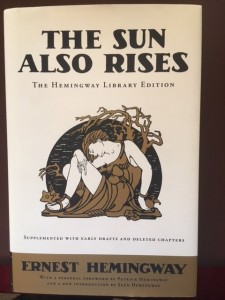By Joseph Bentz
Millennials, the much-picked-on generation of young people from about 18 years old to their early 30s, are often referred to as the “Lost Generation.” A Washington Post opinion writer named Catherine Rampell summed up many of the stereotypes about this  generation in an article she wrote (with “Lost Generation” in the headline) a couple years ago: “For years you’ve probably been reading about aimless, idle millennials hunkering down in their parents’ basements, filling their days with video games, Instagram and deep, longing gazes upon their shelf of participation trophies. Members of the Boomerang Generation simply haven’t been sufficiently motivated — or well-parented? — to get a damn job, spouse and apartment of their own already.”
generation in an article she wrote (with “Lost Generation” in the headline) a couple years ago: “For years you’ve probably been reading about aimless, idle millennials hunkering down in their parents’ basements, filling their days with video games, Instagram and deep, longing gazes upon their shelf of participation trophies. Members of the Boomerang Generation simply haven’t been sufficiently motivated — or well-parented? — to get a damn job, spouse and apartment of their own already.”
The term “Lost Generation” is borrowed from Ernest Hemingway’s novel, The Sun Also Rises, published in 1926. I am teaching that novel right now in a literature course at Azusa Pacific University. The quote “You are all a lost generation” appears as an epigraph on the first page of the novel, and it is attributed to Gertrude Stein.
According to a story Stein told, the “lost generation” phrase came from a French garage mechanic who said he could not hire anyone between the ages of 22 and 30 because  they were no good, spoiled, lacked respect, and drank too much. Does that sound like a familiar list of complaints about today’s “lost generation”? Never mind that the young ne’er-do-wells Stein and the garage owner were referring to had just won World War I. They were still “lost.”
they were no good, spoiled, lacked respect, and drank too much. Does that sound like a familiar list of complaints about today’s “lost generation”? Never mind that the young ne’er-do-wells Stein and the garage owner were referring to had just won World War I. They were still “lost.”
When Hemingway’s novel came out, his publisher’s advertising team “pushed it as the tome encapsulating the voice of the ‘war generation too strongly dosed with reality . . . all illusions shattered, all reticences dissipated,’” according to scholar Lesley M.M. Blume.
Hemingway was not pleased with that marketing strategy. Defining an entire generation had not been his intention. His Lost Generation quote shares the page with another epigraph, a quote from Ecclesiastes, which begins, “One generation passeth away, and another generation cometh; but the earth abideth forever. . . .The sun also ariseth, and the sun goeth down, and hasteth to the place where he arose. . . .”
He meant for the quotes to comment on one another. As Blume explains, Hemingway believed “Stein’s ‘lost generation’ remark was merely ‘bombast,’ and he had meant to lampoon its pomposity, not endorse it. . . .To Hemingway, the whole point of the book was that ‘the earth abideth forever.’ Wasn’t that obvious enough?”
When it comes to rejecting easy labels for an entire generation, I’m with Hemingway. I  teach Millennials at APU and have done so ever since they came along. I don’t think they’re any more “lost” than any other generation I have taught. They do have their quirks. They don’t take notes in class as much as previous generations, for instance. They would rather take a picture of what I write on the whiteboard than copy it down on paper. They can’t write in cursive as well as previous generations, and some of them have trouble even reading it. They’d rather text than talk on the phone, and email strikes them as old-fashioned.
teach Millennials at APU and have done so ever since they came along. I don’t think they’re any more “lost” than any other generation I have taught. They do have their quirks. They don’t take notes in class as much as previous generations, for instance. They would rather take a picture of what I write on the whiteboard than copy it down on paper. They can’t write in cursive as well as previous generations, and some of them have trouble even reading it. They’d rather text than talk on the phone, and email strikes them as old-fashioned.
But lost? Only in the way that all generations are lost. The King James Bible that Hemingway was quoting from teaches that all human beings are lost in and in need of rescue by Jesus Christ. Hemingway was reluctant to follow the teaching all the way to redemption, but he did agree with the lost part. He simply didn’t think one generation was all that different from another.
I am skeptical of generational stereotypes or conclusions. In the more than 30 years that I have taught English, people have often asked, why can’t students write as well as they used to? But people have always said that. Gertrude Stein had trouble finding a good garage mechanic a hundred years ago, and it isn’t so easy today either. But let’s not blame any particular generation. “One generation passeth away, and another generation cometh; but the earth abideth forever.”
Comments 2
Excellent article and thought provoking, as I tend to agree with some of the generalized notions you listed above, that the millennials have been indulged, and all too many of them aren’t self-directed, and have a sense of entitlement rather than taking on responsibility. But there are also many who do not fit that category, who are responsible, and motivated to achieve in their careers and be a contributor to society. My generation gap is widening more and more, and I must learn to adapt to changes today.
Author
Thanks, Lois! I am encouraged by the millennials I get to teach at APU every day. Most of them are hard-working, idealistic people. They have their quirks, but so does every generation!